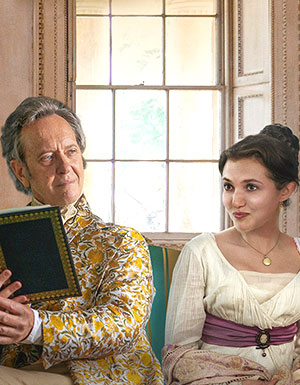As the saying goes, everyone has an opinion, and when it comes to Jane Austen and Netflix’s “Persuasion,” those opinions are strong. Below, we share two reviews of the 2022 film. One of our writers found the movie to be, to paraphrase Austen’s Darcy, tolerable because of two notable performances but not handsome enough to tempt her into more heartfelt feelings, and the other thought the new adaptation was a fun and delightful affair.
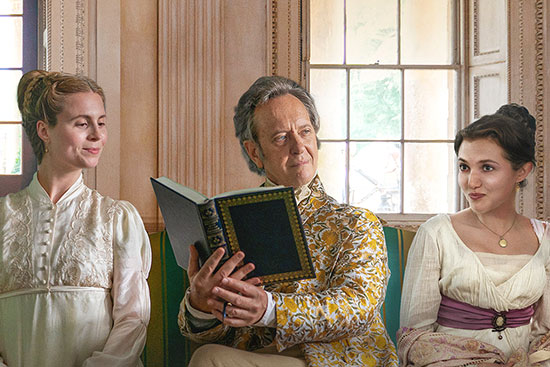
To help keep this site running: Willow and Thatch may receive a commission when you click on any of the links on our site and make a purchase after doing so.
Both writers, like many fans of period dramas, were all anticipation when they learned there was to be another adaptation of a Jane Austen’s Persuasion. The two existing mini-series were released back in 1971 and 2007, and with the only feature length production sandwiched between them more than 25 years ago in 1995, the classic book was due for another take.
But for many Janeites, the trailer for Netflix’s “Persuasion” (2022) raised concerns that the showrunners didn’t understand Austen. Some vowed, based on the trailer alone, not to watch. But many, many, others gave it a chance, and now the film has viewers firmly divided, bringing to mind Pride and Prejudice’s, “Laugh as much as you choose, but you will not laugh me out of my opinion,” and Persuasion’s “How quick come the reasons for approving what we like.”
Or to pull a quote from Emma, “One half of the world cannot understand the pleasures of the other.” But let us try.
Two Good Morsels in Persuasion (2022)
Is comedic relief enough to save a viewer’s opinion? Netflix’s “Persuasion” (2022) would be a charming historical dramedy if it were not for the framework of Jane Austen’s novel, and the film may have stood a chance with Janeites if its narrative hadn’t already been so expertly molded by Jane Austen’s pen.
As it is, a purist must find the best from the bad if there’s to be the slightest prospect of enjoying an adaptation. Fortunately, there are two good morsels that allow us to do so.
Jane Austen superfans around the globe were tensed in expectation of Netflix’s take on her 1817 publication, Persuasion. Relief, however, was an ungranted gift as many Janeites tuned in for the premiere of the new, hot British period drama on July 15. Soon, reviews broke through the floodgate of social media heckling the film and its performers for historical inaccuracy—and worse—disloyalty to the sacred text.
An especially witty critique has been making the rounds on Twitter, claiming that Dakota Johnson, who plays Anne Elliot, “unfortunately has the face of someone who has seen a cell phone.” And perhaps @hcohenwriter is correct to imply that if the novel is a ten, then the adaptation is widely considered a fat zero by purists.
Is it possible to love disparate pieces of a project even if the whole is not one’s cup of tea? There is value in compartmentalizing aspects of film adaptations to create a more sympathetic view towards the intentions of the filmmakers and the actors. Completism drives many Austen-lovers to collect top-tier adaptations like children collect Pokémon and discard less-than-perfect page-to-screen projects.
The possessive love for BBC’s 1995 “Pride and Prejudice” series is a shining example of this completism. There is nothing wrong with an all-consuming appreciation for media that has fueled curiosity and inspired imaginations; just as there is nothing wrong with picking out morsels of goodness from films that wouldn’t otherwise top one’s favorites list.
So here we are, two glorious morsels in hand plucked from Netflix’s “Persuasion”: Richard E. Grant and Mia McKenna-Bruce as Sir Walter Elliot and Mary Musgrove are together the truest remnant of the original text.
Throughout the narrative, Anne’s observations of the people around her, and internal examinations of herself are punctuated by her father’s and youngest sister’s hyperbolic antics. Persuasion is arguably Austen’s most contemplative novel. Anne Elliot is senior amongst prior Austen heroines at the ripe age of twenty-seven. Within those years is despair over losing a mother, a home at Kellynch Hall, and solitary contemplation of romantic opportunities lost.
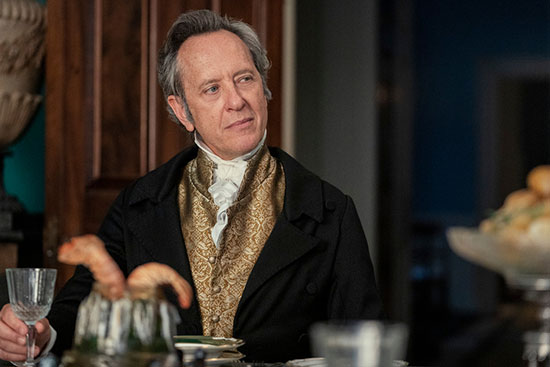
In the film, Lady Russell (Nikki Amuka-Bird) and the Elliot lawyer discuss ways the family can cut costs by renting out the estate to a Colonel and his wife and transplanting to Bath. Captain Wentworth (Cosmo Jarvis) is mentioned as the Colonel’s brother-in-law, and Johnson’s Anne peers plaintively out the window upon hearing his name. At this point Sir Walter Elliot is bemoaning to Lady Russell, “you really think my skin will do well in Bath?” If Austen is known for anything outside the marriage plot, it’s the sly critique of upper-class vanity.
The spirit of Austen’s wit lives on in Richard E. Grant’s portrayal later when Anne joins the family in Bath. The eldest sisters and Mrs. Clay (Lydia Rose Bewley) butter toast and drink tea when Sir Walter gasps at the morning paper. Eyes practically rolling back into his head, he proclaims, “Joy! I’m experiencing joy,” upon reading that the dowager Viscountess Dalrymple and her daughter are in the city.
This is the happiest the audience has hitherto seen Sir Walter; and he feels all that joy only to be presented in frocks to two painstakingly silent women with titles and prestige. Grant sits erect with rapt focus, squeezed between his daughters and Mrs. Clay, in a perfect imitation of the written character: “Vanity was the beginning and the end of Sir Walter Elliot’s character; vanity of person and of situation.” One almost craves Grant’s comedic persona throughout, despite the ridiculousness of the character he embodies.
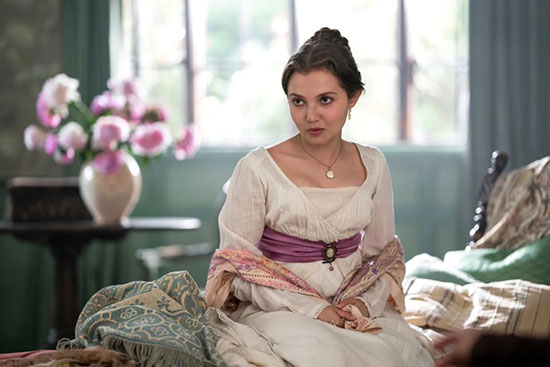
The same approving sentiment applies to the querulous Mary Musgrove, expertly portrayed by Mia McKenna-Bruce. Bruce’s Mary possesses a manipulative expertise that heightens Austen’s character from petulant to wily in her mission to garner attention and avoid any activity she considers too taxing.
In one scene, Charles (Doc Brown) suggests his wife stay home to care for their son who is injured from a fall. Meanwhile, the rest of the party is set to attend the dinner next door where Captain Wentworth will be formally introduced. The audience can see the lightbulb of an idea flicker in Mary’s eyes when she sits up and urges her family to understand that she’s “an empath” and “the least equipped to be with [her] children when they’re suffering.”
This off-the-cuff and—admittedly—contemporary argument is enough to urge Anne to stay with her nephew. Mary Musgrove alone is a miserable literary companion, but to see Bruce’s portrayal is to dislike Mary yet to laugh at her too.
Behold! Two morsels of goodness from an adaptation that has been dragged and scraped across the rocks of sharp criticism. And how hard is it, really, to watch and enjoy anything with Richard E. Grant? — Kailey Rhone
A Pleasing Persuasion (2022)
What’s the point of adapting classic literature to film? Is it simply to regurgitate the story into a visual format? Or should it allow the director, the screenwriter, and the actors a chance to explore the source material in different ways?
According to our Behind the Scenes peek, director Carrie Cracknell deliberately chose to update aspects of Jane Austen’s Persuasion in order to appeal to a broad audience. This includes breaking the fourth wall, deliberate anachronisms, and millennial-style quips like “Now we’re worse than exes. We’re friends.”
When the trailer for Cracknell’s adaptation was first released, Austenites were outraged by these choices, claiming the spirit of the original novel was destroyed. Yes, Cracknell’s film directorial debut is a far cry from the gentle, understated Austen adaptations like Ang Lee’s “Sense and Sensibility” (1995) or even Joe Wright’s controversial “Pride and Prejudice” (2005). But her light modernization is a great part of the film’s charm, especially for viewers who may be encountering Austen’s work for the first time.
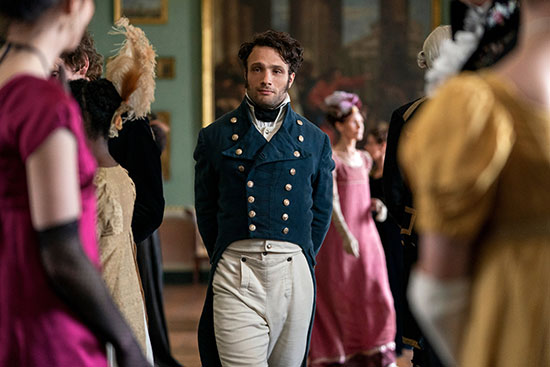
Published six months after Austen’s death, Persuasion is widely seen as her most mature work. Heroine Anne Elliott (here played by Dakota Johnson) fell in love with the noble but penniless sailor Frederick Wentworth (Cosmo Jarvis), but was persuaded by her status-obsessed family to give him up. Now, eight years later, Wentworth has risen to the top of the British navy and earned a fortune, and Anne continues to pine for him.
Austen’s novel examines the pain of having a former lover re-enter one’s life unexpectedly, as well as the possibilities that young love might mature into something lasting. Anne is much more reserved than other Austen heroines—she is not as forthright as Lizzie Bennet, nor as scheming as Emma Woodhouse—and her sincerity and thoughtfulness make for a much quieter story.

While the screenplay, penned by Ron Bass and Alice Victoria Winslow, certainly modernizes some of Austen’s language (her novels certainly never included the line “If you’re a five in London, you’re a ten in Bath”), it only highlights the social satire embedded in Austen’s work.
Anne’s father, Sir Walter Elliot (Richard E. Grant, in fine form), is obsessed with himself and his family’s social standing, despite the fact that he’s managed to lose the Elliot fortune. “What good is a title if you have to earn it?” he moans, when he learns that an admiral will rent his estate. His paramour, Mrs. Penelope Clay (Lydia Rose Bewley), brings up the aforementioned beauty ranking in an attempt to assuage his despair at having to relocate to Bath.
It all sounds slightly ridiculous coming out of the mouths of Regency-clad actors, but that’s the point. The film is in on the joke, as is Anne, who looks directly into the camera as she chomps on an asparagus spear. While everyone around her focuses on appearances and social standing, she sees through their hypocrisy, and that sets her apart. She’s on the viewer’s side, not her family’s.
Indeed, it quickly becomes clear that while her family may have persuaded her not to marry a penniless sailor, the Elliots are now the ones who’ve lost their fortune, while Wentworth has not only earned his but become a captain, as well. The deliberate anachronisms read initially as comedy—and it is a very funny film—but they also serve to highlight just how alienated Anne is from her family.
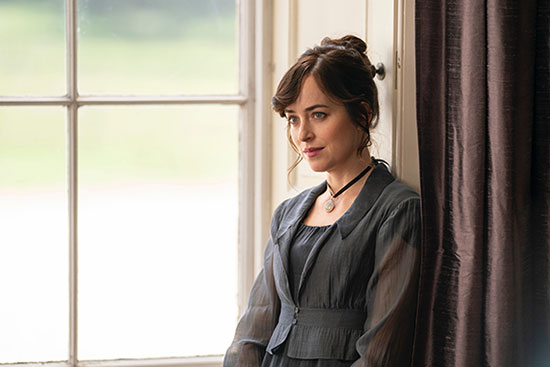
Now, what of the argument that Dakota Johnson’s Anne is too modern for a traditional Austen adaptation? Is it her constant breaking of the fourth wall that sets critics’ teeth grinding? It’s an unusual choice for a period drama, but in this case it replaces the extensive interiority of Austen’s narration. Anne delivers her thoughts straight to the viewer, from describing herself ironically as “single and thriving” to showing us her keepsakes from Wentworth, including a “playlist” and a “cowbell, whose sad, empty knell best captures my melancholy.”
Decades of period dramas have taught us to expect specific replacements for novels’ narration, such as a voiceover, letters read aloud, or actors’ lingering glances while backed by a sweeping score. But that doesn’t mean those are the only options. In this case, Cracknell has chosen to allow Anne to speak directly to the viewer. It doesn’t make her more forthright or more modern. While Anne occasionally brings up awkward conversation at the dinner table, she still takes a supporting role in the lives of her family members. Her actions continually adhere to those of Austen’s original vision; it’s only her narration that feels different.
Other viewers have criticized the color-conscious casting that sets Nigerian-born actress Nikki Amuka-Bird as Anne’s dear friend Lady Russell, and Ben Bailey (of Jamaican descent) as Charles Musgrove. Yet given Cracknell’s determination to bring “Persuasion” to a modern audience, this decision rings just as true as Anne’s unconventional narration. A more diverse cast allows viewers to see themselves in Austen’s stories where they may not have in previous adaptations.
We’ve accepted fully modernized adaptations of Austen texts with open arms, from “Clueless” (considered a classic update of “Emma”) to “Bridget Jones’s Diary,” in which Colin Firth, seen by many as the best Fitzwilliam Darcy in the BBC’s 1995 “Pride and Prejudice,” plays a character named Mark Darcy. It doesn’t get much more modernized than that. (The sequel based on Bridget Jones: The Edge of Reason, written by Helen Fielding as an homage to Persuasion, all but lost the many references to the book by the time it made it to the screen.)
Isn’t there also room for a funny, lightly anachronistic Regency-ish adaptation of “Persuasion”?
If we want to revisit Austen’s original story, we can just read the book. We come to film for different reasons, and Cracknell’s version provides a refreshing new take that’s worth a second look. — Abby Murphy
Kailey Rhone makes use of their English degree working as a production editor in the world of academic publishing. They can be found rewatching “Downton Abbey” or writing about intersectional feminism and the quiet power of Jane Austen’s Anne Elliot. Their work can be found in Persuasions.
Abby Murphy writes young adult books about girls discovering their strengths. A member of SCBWI and The Historical Novel Society, she is represented by Laura Crockett of Triada US Literary Agency. You can visit her blog here, where she writes about reading, writing, history, and her incurable Anglophilia.
If you enjoyed this post, be sure to see The Period Films List, with the best British, historical and costume dramas sorted by era. You’ll especially like the Best Period Dramas: Georgian and Regency Eras List. Also see Behind the Scenes of Persuasion (2022).

